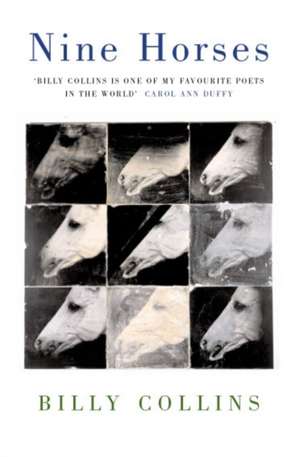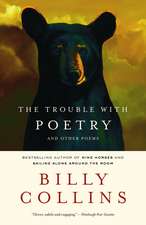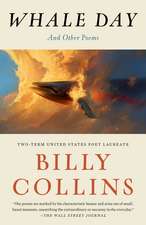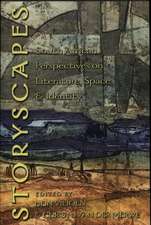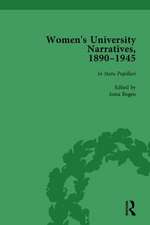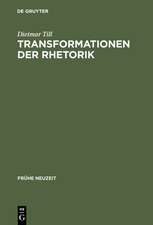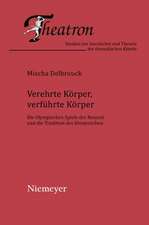Nine Horses
Autor Billy Collinsen Limba Engleză Paperback – 20 mar 2003
| Toate formatele și edițiile | Preț | Express |
|---|---|---|
| Paperback (2) | 46.43 lei 22-36 zile | +29.62 lei 5-11 zile |
| Pan Macmillan – 20 mar 2003 | 46.43 lei 22-36 zile | +29.62 lei 5-11 zile |
| Random House Trade – 30 sep 2003 | 106.56 lei 43-57 zile |
Preț: 46.43 lei
Preț vechi: 69.04 lei
-33% Nou
Puncte Express: 70
Preț estimativ în valută:
8.89€ • 9.66$ • 7.47£
8.89€ • 9.66$ • 7.47£
Carte disponibilă
Livrare economică 31 martie-14 aprilie
Livrare express 14-20 martie pentru 39.61 lei
Preluare comenzi: 021 569.72.76
Specificații
ISBN-13: 9780330413046
ISBN-10: 033041304X
Pagini: 144
Dimensiuni: 129 x 197 x 14 mm
Greutate: 0.17 kg
Ediția:2nd ed
Editura: Pan Macmillan
Locul publicării:United Kingdom
ISBN-10: 033041304X
Pagini: 144
Dimensiuni: 129 x 197 x 14 mm
Greutate: 0.17 kg
Ediția:2nd ed
Editura: Pan Macmillan
Locul publicării:United Kingdom
Notă biografică
Billy Collins has received fellowships from the New York Foundation for the Arts, the National Endowment for the Arts and the Guggenheim Foundation. A professor of English at Lehman College, he was appointed Poet Laureate of the United States for 2001¿2003. He lives with his wife in Westchester County, NY.
Extras
i.
The Country
I wondered about you
when you told me never to leave
a box of wooden, strike-anywhere matches
lying around the house because the mice
might get into them and start a fire.
But your face was absolutely straight
when you twisted the lid down on the round tin
where the matches, you said, are always stowed.
Who could sleep that night?
Who could whisk away the thought
of the one unlikely mouse
padding along a cold water pipe
behind the floral wallpaper
gripping a single wooden match
between the needles of his teeth?
Who could not see him rounding a corner,
the blue tip scratching against a rough-hewn beam,
the sudden flare, and the creature
for one bright, shining moment
suddenly thrust ahead of his time—
now a fire-starter, now a torchbearer
in a forgotten ritual, little brown druid
illuminating some ancient night.
Who could fail to notice,
lit up in the blazing insulation,
the tiny looks of wonderment on the faces
of his fellow mice, onetime inhabitants
of what once was your house in the country?
Velocity
In the club car that morning I had my notebook
open on my lap and my pen uncapped,
looking every inch the writer
right down to the little writer’s frown on my face,
but there was nothing to write
about except life and death
and the low warning sound of the train whistle.
I did not want to write about the scenery
that was flashing past, cows spread over a pasture,
hay rolled up meticulously—
things you see once and will never see again.
But I kept my pen moving by drawing
over and over again
the face of a motorcyclist in profile—
for no reason I can think of—
a biker with sunglasses and a weak chin,
leaning forward, helmetless,
his long thin hair trailing behind him in the wind.
I also drew many lines to indicate speed,
to show the air becoming visible
as it broke over the biker’s face
the way it was breaking over the face
of the locomotive that was pulling me
toward Omaha and whatever lay beyond Omaha
for me and all the other stops to make
before the time would arrive to stop for good.
We must always look at things
from the point of view of eternity,
the college theologians used to insist,
from which, I imagine, we would all
appear to have speed lines trailing behind us
as we rush along the road of the world,
as we rush down the long tunnel of time—
the biker, of course, drunk on the wind,
but also the man reading by a fire,
speed lines coming off his shoulders and his book,
and the woman standing on a beach
studying the curve of horizon,
even the child asleep on a summer night,
speed lines flying from the posters of her bed,
from the white tips of the pillowcases,
and from the edges of her perfectly motionless body.
From the Hardcover edition.
The Country
I wondered about you
when you told me never to leave
a box of wooden, strike-anywhere matches
lying around the house because the mice
might get into them and start a fire.
But your face was absolutely straight
when you twisted the lid down on the round tin
where the matches, you said, are always stowed.
Who could sleep that night?
Who could whisk away the thought
of the one unlikely mouse
padding along a cold water pipe
behind the floral wallpaper
gripping a single wooden match
between the needles of his teeth?
Who could not see him rounding a corner,
the blue tip scratching against a rough-hewn beam,
the sudden flare, and the creature
for one bright, shining moment
suddenly thrust ahead of his time—
now a fire-starter, now a torchbearer
in a forgotten ritual, little brown druid
illuminating some ancient night.
Who could fail to notice,
lit up in the blazing insulation,
the tiny looks of wonderment on the faces
of his fellow mice, onetime inhabitants
of what once was your house in the country?
Velocity
In the club car that morning I had my notebook
open on my lap and my pen uncapped,
looking every inch the writer
right down to the little writer’s frown on my face,
but there was nothing to write
about except life and death
and the low warning sound of the train whistle.
I did not want to write about the scenery
that was flashing past, cows spread over a pasture,
hay rolled up meticulously—
things you see once and will never see again.
But I kept my pen moving by drawing
over and over again
the face of a motorcyclist in profile—
for no reason I can think of—
a biker with sunglasses and a weak chin,
leaning forward, helmetless,
his long thin hair trailing behind him in the wind.
I also drew many lines to indicate speed,
to show the air becoming visible
as it broke over the biker’s face
the way it was breaking over the face
of the locomotive that was pulling me
toward Omaha and whatever lay beyond Omaha
for me and all the other stops to make
before the time would arrive to stop for good.
We must always look at things
from the point of view of eternity,
the college theologians used to insist,
from which, I imagine, we would all
appear to have speed lines trailing behind us
as we rush along the road of the world,
as we rush down the long tunnel of time—
the biker, of course, drunk on the wind,
but also the man reading by a fire,
speed lines coming off his shoulders and his book,
and the woman standing on a beach
studying the curve of horizon,
even the child asleep on a summer night,
speed lines flying from the posters of her bed,
from the white tips of the pillowcases,
and from the edges of her perfectly motionless body.
From the Hardcover edition.
Recenzii
“A poet of plentitude, irony, and Augustan grace.”
—The New Yorker
“A sort of poet not seen since Robert Frost.”
—The Boston Globe
“It is difficult not to be charmed by Collins, and that in itself is a remarkable literary accomplishment.”
—The New York Review of Books
“One appeal of the typical Collins poem is that it’s less able to help you memorize it than to help you remember,
for a little while anyway, your own life.”
—The New York Times Book Review
—The New Yorker
“A sort of poet not seen since Robert Frost.”
—The Boston Globe
“It is difficult not to be charmed by Collins, and that in itself is a remarkable literary accomplishment.”
—The New York Review of Books
“One appeal of the typical Collins poem is that it’s less able to help you memorize it than to help you remember,
for a little while anyway, your own life.”
—The New York Times Book Review
